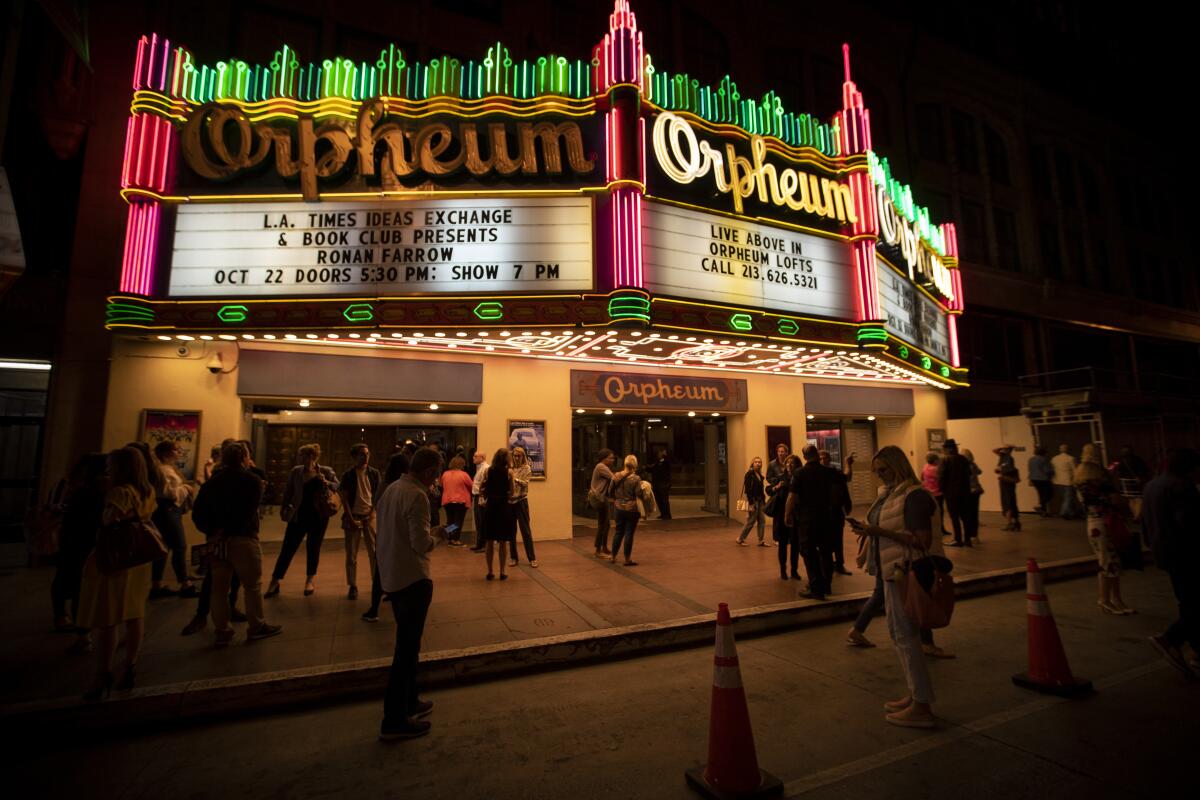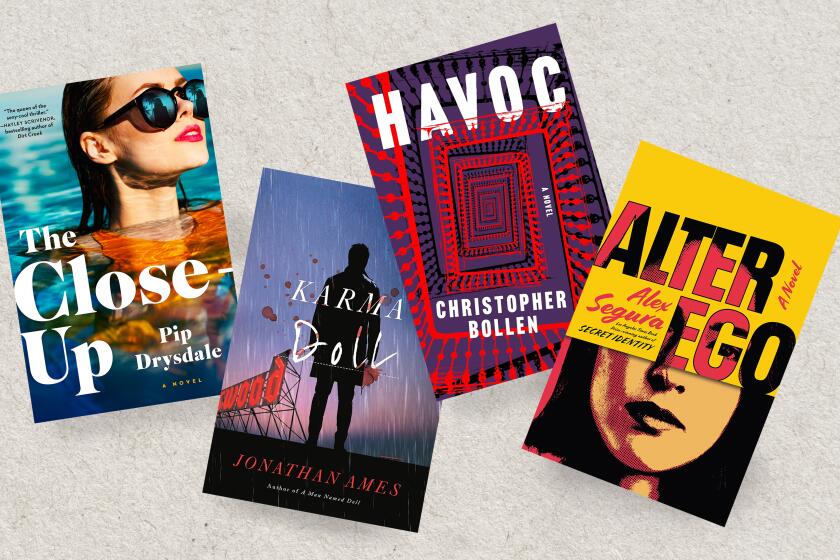Ronan Farrow talks surveillance, countersurveillance and the stories behind ‘Catch and Kill’
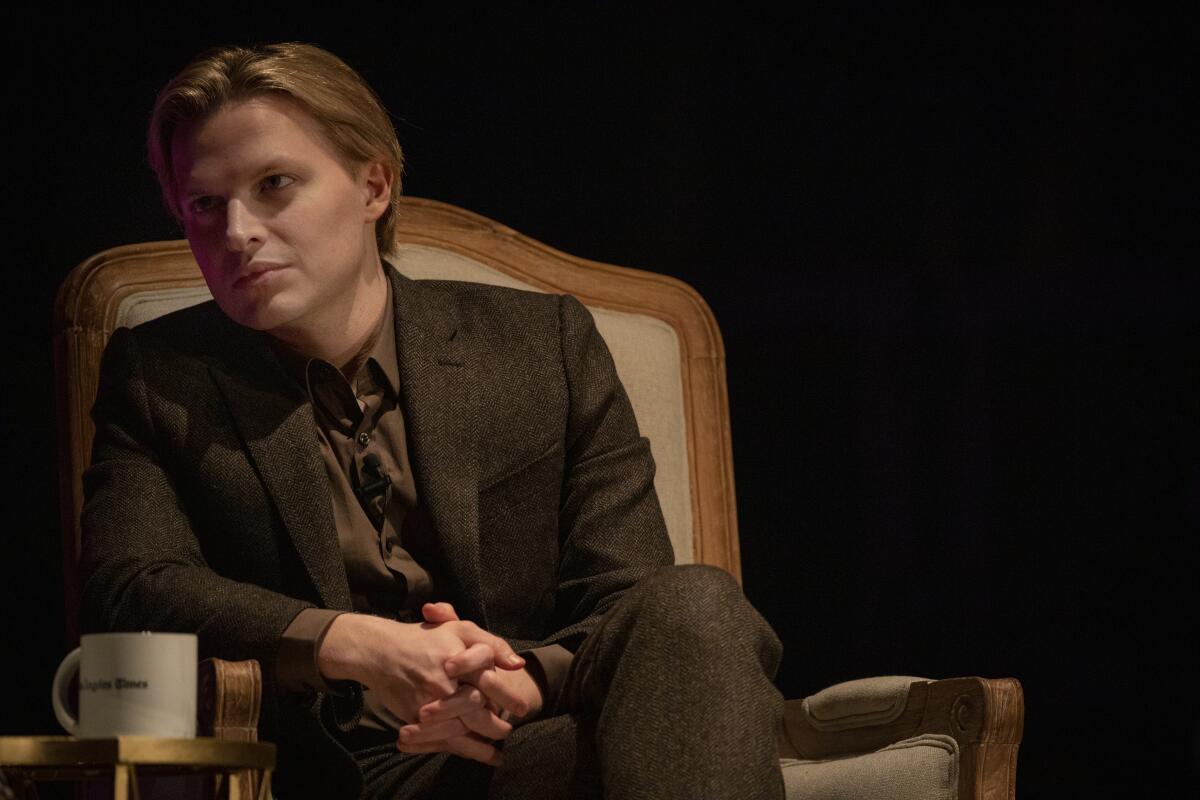
Ronan Farrow says his new book detailing sexual abuse allegations against movie mogul Harvey Weinstein and other powerful men “is not without darkness,” but he ultimately sees it as a tale of hope.
“It’s the story of really brave people,” Farrow told a packed house at the Orpheum Theatre on Tuesday night, “people who refused to shut up.”
Farrow talked about the reporting and the story behind the reporting of his new book, “Catch and Kill,” which is equal parts tick-tock, memoir and true crime story.
In a conversation with Times Deputy Managing Editor Julia Turner, Farrow described the pressure he and other journalists faced to cease reporting on the Weinstein allegations and detailed a web of intimidation, surveillance and spies.
His previous stories in New Yorker magazine earned a Pulitzer Prize for Public Service and fueled the #MeToo movement. But on Tuesday Farrow reserved his admiration for fellow journalists working to break paradigm-shifting news and the sources who bravely tell their stories.
“At a time when authoritarian rhetoric is weaponized against this profession,” Farrow said, his work of investigative journalism “is a love letter to a whole community of other reporters.”
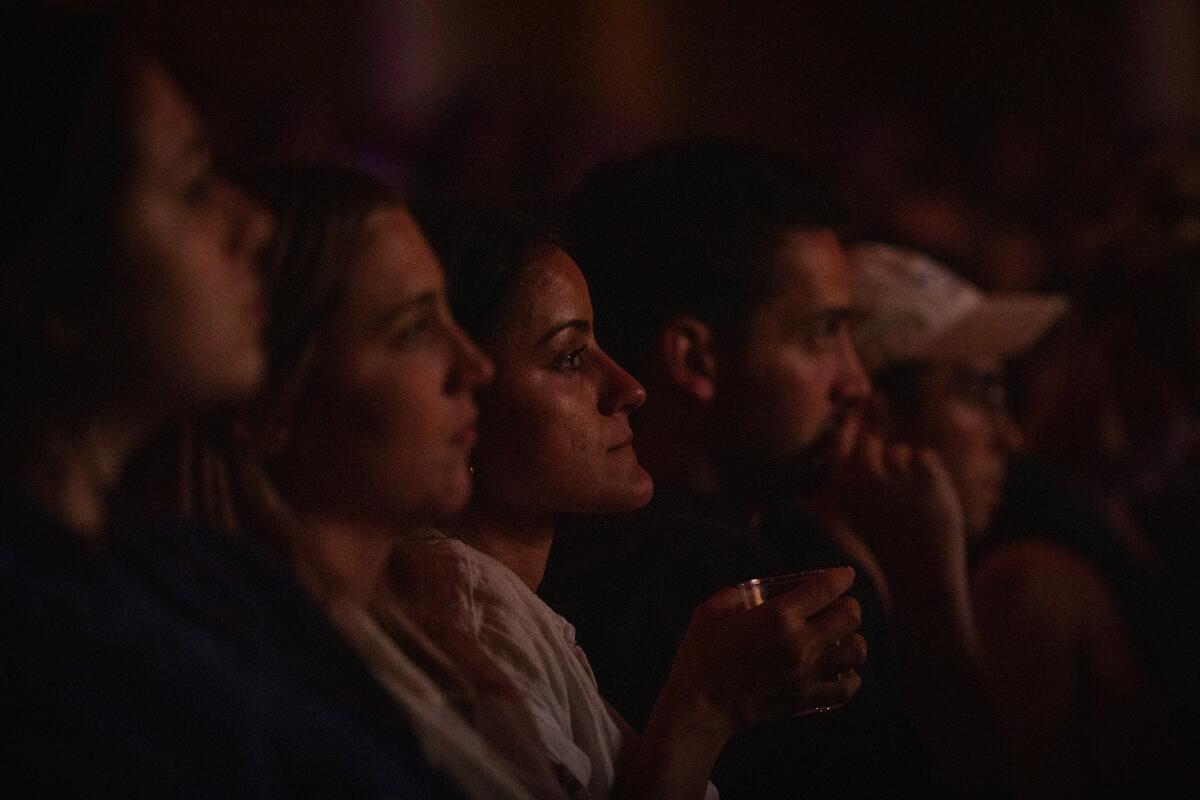
He acknowledged the strength and courage of the women who spoke to him on the record about abuse, including actresses Illeana Douglas and Rosanna Arquette, who were both in attendance at the forum hosted by the Los Angeles Times Book Club and the Times Ideas Exchange.
In the book, Farrow alleges he was trailed by undercover operatives hired by Weinstein, who is awaiting trial on rape and other charges. On stage Farrow recounted the experience with dizzying detail — and a dash of humor.
After receiving a series of suspicious phone calls, Farrow said he saved the number in his phone as “Weinstein Plant?” and was followed by agents working for an intelligence company ominously called “Black Cube.” He discovered that photographs had been taken of his front door when one of the agents became an informant. Concerned for his safety, a friend suggested Farrow get a gun.
He described Weinstein’s alleged espionage as “a producer’s flair for the dramatic,” drawing laughs from the crowd. “Mostly people are following me around trying to kill or blackmail me,” he added after audience applause, “So this is nice.”
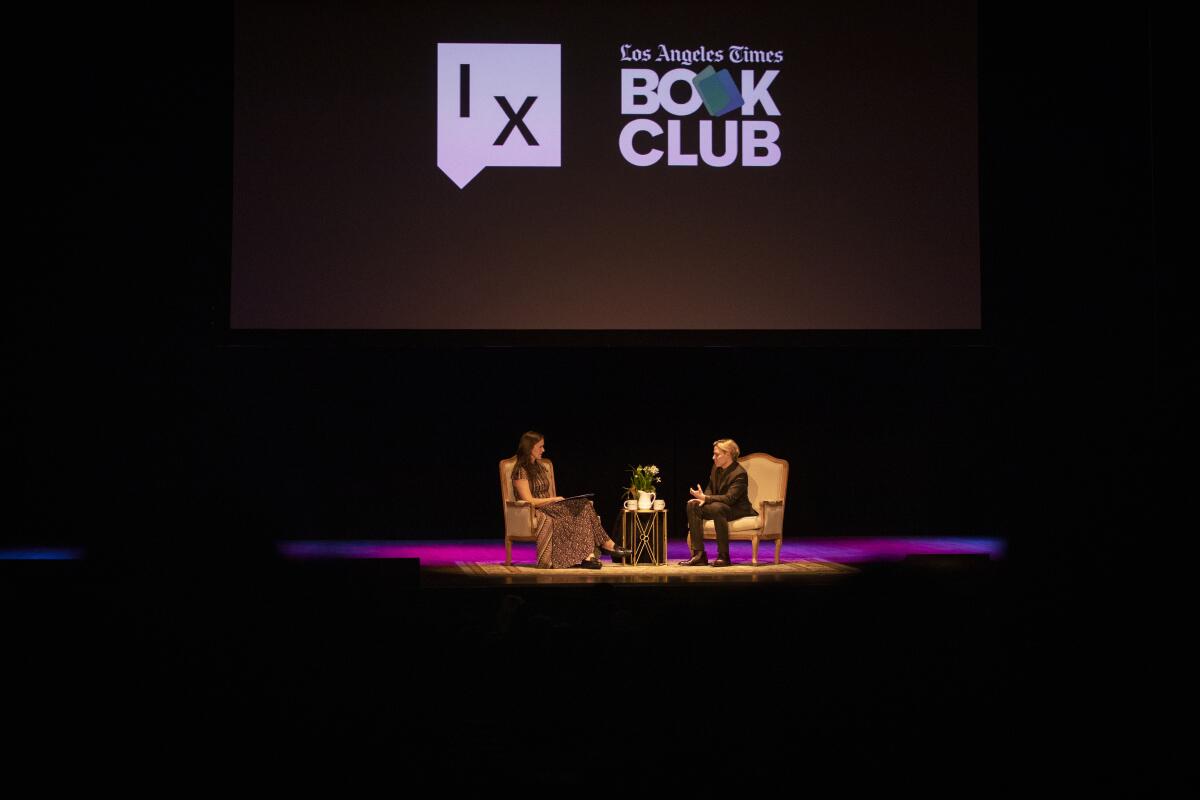
In “Catch and Kill,” Farrow alleges Weinstein pressured NBC executives to quash reporting by leveraging dirt on former “Today” show co-host Matt Lauer. Farrow subsequently left NBC and published his investigation in the New Yorker.
The plot thickens: NBC has since launched a counterattack against Farrow and “Catch and Kill.” NBC disputes Farrow’s allegations, saying his work was neither substantiated nor ready to run.
Farrow, the son of actress Mia Farrow and director Woody Allen, has long lived in the public eye as well as the shadow of scandal. His sister, Dylan Farrow, accused Allen of sexually abusing her in 1992, a controversy that Weinstein tried to use to discredit Ronan Farrow’s reporting.
“These incredibly personal things that I’ve tried to outrun for years get thrown at me,” Farrow said. “People play dirty.”
Farrow ventured that his personal connection to the material “informed my understanding and hopefully my sensitivity to the issue” but was quick to confess his own shortcomings. Previously, he told his sister to “just move on”; now he says he sees how brave she was. His awakening to the stories of survivors, he said, has mirrored the larger culture’s steps toward supporting women.
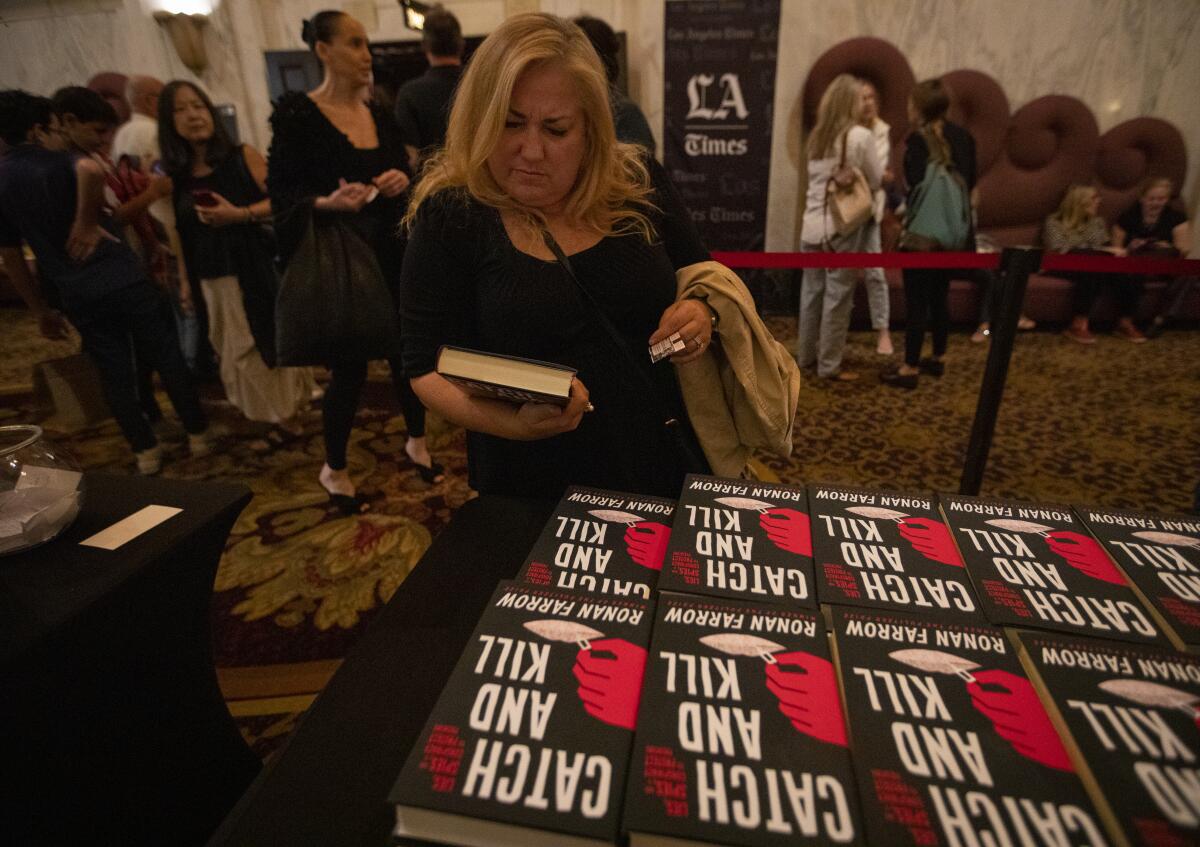
Farrow said that, as a reporter, he had been reticent to braid his own narrative into the story but that a book both accommodates and demands that level of complexity. “Catch and Kill” is a detailed, reported work of nonfiction, but Farrow also cited detective novelists Raymond Chandler and Dasheill Hammett as inspirations. “I did want it to live in a dramatic structure,” he said of the narrative.
Similarly, he chose to include the account of Asia Argento, who said she had both consensual and nonconsensual encounters with Weinstein and has since been accused of perpetrating sexual assault against a younger man, to represent “the complex reality of sexual violence” and cycles of abuse.
Organizers of the #MeToo survivors march were in attendance Tuesday night, including Karen Pomer, whose rape and subsequent mistreatment by authorities was reported by Times reporter Robin Abcarian in 1996.
Shedding light on the stories of survivors and exposing the suppression of those stories is a step toward systemic change. “It’s very empowering for #MeToo survivors to see our stories told,” Pomer said. “When one rape survivor is empowered, it empowers the rest of us.”
The next Los Angeles Times Book Club and Times Ideas Exchange event is Nov. 18, when actress Julie Andrews will discuss “Home Work: A Memoir of My Hollywood Years” with Pulitzer Prize-winning Times columnist Mary McNamara. For updates, sign up at latimes.com/bookclub.
